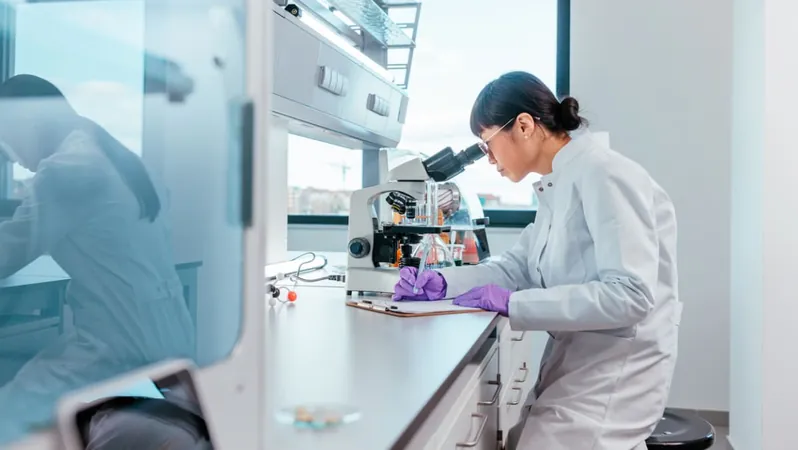
Revolutionary AI Model Unveils High-Risk Patients for Sudden Cardiac Arrest
2025-07-02
Author: Li
AI Outshines Doctors in Cardiac Risk Assessment
A groundbreaking AI model has emerged that significantly outperforms traditional medical assessments in identifying patients at risk of sudden cardiac arrest. This innovative system leverages long-overlooked heart imaging techniques alongside comprehensive medical histories to uncover insights about heart health that have eluded human clinicians.
A Life-Saving Leap Forward
Led by researchers at Johns Hopkins University and backed by federal funding, this revolutionary approach has the potential to save countless lives while also reducing unnecessary medical procedures, such as the implantation of unneeded defibrillators.
"We see patients losing their lives in their prime because they lack adequate protection, while others endure the lifelong burden of defibrillators that offer them no true benefit," asserts senior researcher Natalia Trayanova. "With our AI, we can now predict a patient's risk of sudden cardiac death with remarkable accuracy."
Hypertrophic Cardiomyopathy: A Silent Killer
Hypertrophic cardiomyopathy, a prevalent hereditary heart condition affecting one in every 200 to 500 individuals, ranks among the leading causes of sudden cardiac death, particularly in young people and athletes. While most patients can lead normal lives, a concerning segment is at heightened risk of sudden death, a determination fraught with difficulty for medical professionals.
Breaking the Dice Roll with AI
Existing clinical guidelines for identifying at-risk patients have shown only a 50% accuracy rate—comparable to a game of chance. However, the new AI model, known as the Multimodal AI for Ventricular Arrhythmia Risk Stratification (MAARS), vastly improves this statistic. It evaluates a wide range of medical data, utilizing detailed contrast-enhanced MRI images of the heart to pinpoint risky scarring patterns associated with hypertrophic cardiomyopathy.
"Traditional methods have struggled to interpret the raw MRI data, but our AI can extract essential information that has remained hidden," Trayanova explains.
Impressive Accuracy in Real-World Testing
The team tested the AI model against real patient data from Johns Hopkins Hospital and Sanger Heart & Vascular Institute. While conventional guidelines were accurate about half the time, the AI model achieved an impressive 89% accuracy overall, and a staggering 93% accuracy for patients aged 40 to 60—those most vulnerable to sudden cardiac death.
Tailored Treatment Plans and Future Prospects
In addition to predicting risk, the AI model provides insights into why certain patients are at heightened risk, enabling physicians to create personalized treatment plans. Co-author and Johns Hopkins cardiologist Jonathan Chrispin emphasizes, "This AI development significantly enhances our predictive capabilities, heralding a transformative shift in clinical care."
Previously, in 2022, Trayanova’s team developed another AI model focused on providing personalized survival assessments for patients with heart infarcts. Future research will explore applying this new model to other cardiovascular diseases, such as cardiac sarcoidosis and arrhythmogenic right ventricular cardiomyopathy.
A New Dawn in Cardiac Care
With ongoing testing ahead, this pioneering AI initiative could reshape how we understand and manage heart health, ensuring that more lives are saved while minimizing unnecessary interventions.



 Brasil (PT)
Brasil (PT)
 Canada (EN)
Canada (EN)
 Chile (ES)
Chile (ES)
 Česko (CS)
Česko (CS)
 대한민국 (KO)
대한민국 (KO)
 España (ES)
España (ES)
 France (FR)
France (FR)
 Hong Kong (EN)
Hong Kong (EN)
 Italia (IT)
Italia (IT)
 日本 (JA)
日本 (JA)
 Magyarország (HU)
Magyarország (HU)
 Norge (NO)
Norge (NO)
 Polska (PL)
Polska (PL)
 Schweiz (DE)
Schweiz (DE)
 Singapore (EN)
Singapore (EN)
 Sverige (SV)
Sverige (SV)
 Suomi (FI)
Suomi (FI)
 Türkiye (TR)
Türkiye (TR)
 الإمارات العربية المتحدة (AR)
الإمارات العربية المتحدة (AR)